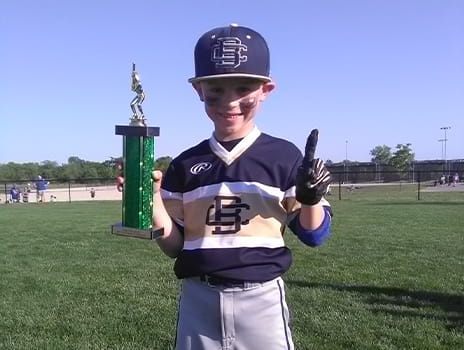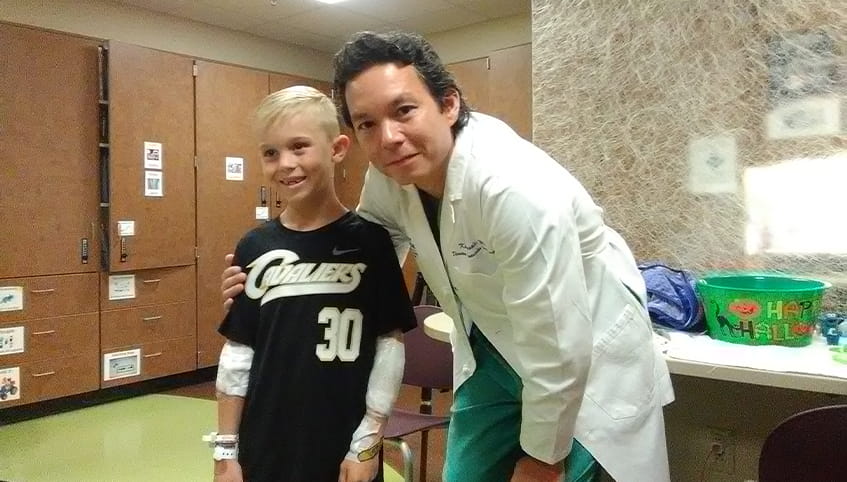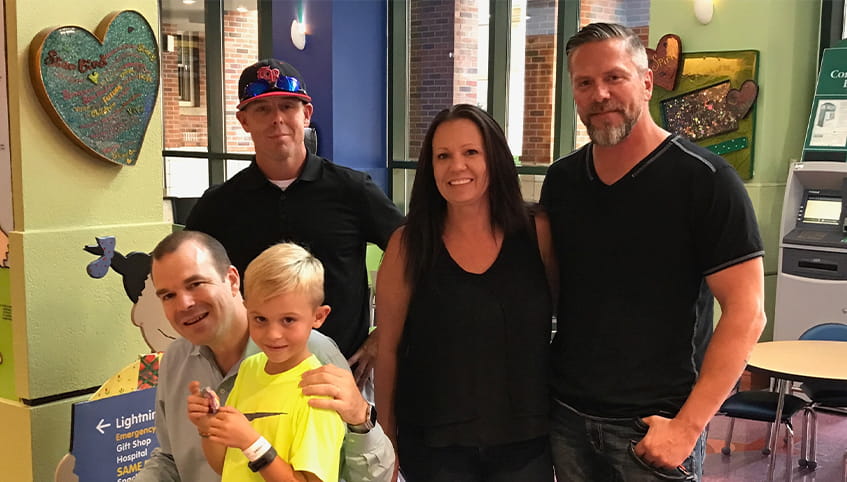Fast Action, Powerful Partnership

In recognition of the Christmas and New Year’s holidays, some of The University of Kansas Health System’s offices will have modified hours on Thursday, December 25, and Thursday, January 1.

November 01, 2018
Mason Payne is athletic and competitive, charming and sweet. In late August 2017, he was the guest of honor at a pool party with family and friends, an early celebration of his upcoming eighth birthday. He was the picture of youth and health, and the last person his parents and loved ones ever suspected would suffer a stroke.
When he complained of a headache that evening, his mother, Amy Fair, chalked it up to 7 hours of swimming and sun. Even Mason himself said, "That was the longest birthday party ever!" Amy and her boyfriend, Josh Turpin, expected an early bedtime and a good night's sleep would put Mason to rights.
But the next morning, Mason still didn't seem himself. At breakfast out, he was dazed and listless and asked to go home to sleep. About 45 minutes into a nap, he woke up disoriented and crying. He began to slur his words and drool. Amy and Josh decided it was time for an ER visit. In the car, Mason was unable to do for himself. He lay on the seat, his head lolling, and Josh buckled his seatbelt.
"All this while, Mason was mentally cognizant, but could not control his body," Josh says. "He remembers most of this. We could see in his eyes how scared he was."
Amy insisted they drive to Children's Mercy Hospital Kansas. It wasn't the closest option, but she remembered a positive prior experience. Her older son, Bailey, had once been treated there for a head injury. The decision proved fortunate in identifying the threat to Mason in time to save him.
Mason's father, Ray Payne, met Amy and Josh in the ER. Staff performed bloodwork and a CT scan.
"These tests showed nothing," Josh says."The doctor there was super smart to get us downtown fast for an MRI."
The team transferred Mason by ambulance to Children's Mercy Hospital Kansas City.
"That's when things got very real," Amy says. "Once we got there, a chaplain followed us around the whole time. I still don't think we really understood what life-threatening danger Mason was in."

The stroke team at Children's Mercy was ready and waiting for Mason's arrival. MRI images – captured and interpreted in record time – revealed a large clot in Mason's basilar artery, blocking blood flow to the brainstem.
"When the doctor said Mason had a blood clot in his brainstem, the room got small, my face got hot, and my stomach knotted," Ray says. "He said time was of the essence, and The University of Kansas Health System had the only doctors qualified to treat this. I said, 'Let's go now. Let's get him and go.'"
Jean-Baptiste Le Pichon, MD, PhD, child neurology residency program director for Children's Mercy, initiated the transfer. He called neurologist Colleen Lechtenberg, MD, director of the Advanced Comprehensive Stroke Center at the health system.
"Our dedicated stroke team serves as the liaison between the referring hospital and our interventional team," Dr. Lechtenberg says. "We are the front-line decision-makers in determining whether transfer to our care is the right course for each patient. In Mason's case, it was a straightforward decision. Dr. LePichon contacted us before Mason was even off the MRI table, allowing us to rapidly mobilize the specialists he needed."
Mason was transferred, and Dr. Lechtenberg and her team evaluated his condition. She and endovascular surgeon Koji Ebersole, MD, ordered an angiogram that confirmed dissection of Mason's left vertebral artery and blockage of the basilar artery. Dr. Ebersole showed Mason's family the scans.
"The left side of Mason's brain looked dark with normal blood flow, but the middle and right were white where blood couldn't get past the clot," Amy recalls.
"Dr. Ebersole was incredible," Ray says. "He very calmly explained Mason's condition. We asked him, 'What would you do if this were your child?' He said he would remove the clot, so that's what we did."
Dr. Ebersole used a flexible catheter to access the clot and suction it out like a vacuum, restoring blood flow to Mason's brain.
"The new images looked like all the power turned back on," Ray says.

The next 48 hours were critical to Mason's recovery. Incredibly, he showed almost no functional deficits just days after the stroke that could easily have taken his life.
"When dealing with a high-stakes medical emergency, it is the job of the medical team to help the family be confident in the face of risks and guide them toward the best therapy," says Dr. Ebersole. "In this instance, there was clear consensus from the doctors' perspectives about what to do, and the family proved very brave and decisive. The result is exactly what we all hoped for."
"The collaboration between Children's Mercy and The University of Kansas Health System leverages the strengths of each hospital to provide state-of-the-art care to children with acute strokes," adds Dr. Le Pichon. "This commitment resulted in a pediatric stroke team only a few other cities in the country can equal. It is the product of years of preparation and of a close partnership between the institutions."
Mason was admitted on Sunday, August 20th. He went home on Thursday, August 24th, his eighth birthday. And he was back in his third-grade classroom on Monday, August 28th.
We offer a variety of appointment types. Learn more or call 913-588-1227 to schedule now.
Today, Mason is frustrated by restriction from his beloved baseball – he's a Cardinals and Indians fan – and basketball for a few more months, but his parents and loved ones know that's the tiniest of hurdles.
"Everything happened fast, from the ER to the diagnosis to the treatment decisions," Ray says. "Mason is determined, resilient and competitive.The doctors and nurses brought tremendous skill and positive energy. All of these things aligned. My son is still here."
"The doctors were absolutely fantastic," Amy adds. "If it weren't for their willingness to take a risk, Mason wouldn't be here today. They were amazing, a true miracle."
Mason is doing extremely well, but his recovery is ongoing.
"Now it's the aftershock," Ray says. "It's the injections and the labs and the follow-up appointments. It's not all rainbows yet, but we'll stay strong, and we'll get there."
Amy can't say enough about Mason's care team.
"The nurses were wonderful," she says. "Mason always got them to take him on walks. He has this little smirk he does that he knows will get him his way. They're probably glad he's gone, because he was constantly trying to escape," she laughs.
But turning serious, Amy recalled how the doctors told her that had Mason received treatment a mere 2 hours later, irreversible brain damage – or worse – would have been likely.
"Everyone was so compassionate, efficient and decisive," she says. "They were everything we needed, and I want to hug them all. We will never again be the same people we were early that Sunday morning."